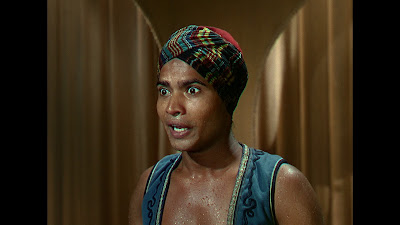The pain of loss and an irreparable air of sadness pervade King Vidor’s Civil War melodrama, which begins in 1861 and ends four years later. However, most of the fighting remains offscreen and the film’s focus is forcefully domestic, the imagery tightly-framed as it deals with the war’s impact on the life of the well-to-do Bedford family, landed Southern gentry: patriarch Malcolm (Walter Connolly), his wife, Sallie (Janet Beecher), their daughter, Valette (Margaret Sullavan), sons Edward (Harry Ellerbe) and 10-year-old Middleton (Dickie Moore), loyal black manservant William (Daniel L. Haynes), and cousin Duncan (Randolph Scott), who runs the family’s business affairs. Most of the action is set in and around the family home, a grand mansion which sits on the grounds of a slave plantation, an opening credit introducing it as “Portobello, the proudest plantation in Mississippi”.
Loosely based on Stark Young’s 1934 novel, this is a film filled with arrivals and departures, a plot strategy classically deployed by Hollywood melodramas (and by Young’s novel). The approach ensures that the dramatic impact of each event is grounded in the family’s emotional response to it. Featuring a garden setting, the mansion is depicted as an idyll, a sanctuary where Malcolm can sip cocktails undisturbed on the verandah. Elsewhere, daily life on the plantation suggests that a comfortable state of affairs exists, at least on the surface, between the slaves and the family.
Edward’s return from university, with his friend, George Pendleton (Robert Cummings, delivering a very broad performance), is a joyous occasion, the welcoming home of a family member who has long been absent. Pendleton’s departure soon afterwards, following the arrival of news about the beginnings of the Civil War, finds Valette’s sweet-voiced rendition of “Beautiful Dreamer” to an enraptured Pendleton giving way to “When Johnny Comes Marching Home”, accompanying the arrival of the soldiers who are soon to depart for uncertain futures. Their eagerness for new adventures is countered by the over-arching sense of storm clouds gathering.
What lies ahead has already been prefigured by an exchange between Malcolm and Sallie in the opening sequence (and by the viewer’s knowledge of the history of the time). He is certain that the rumours of war are false, reassuring her that her dream from the night before is just a dream. “The roses were dripping with blood,” she has fearfully told him (the allusion lending a specific meaning to the title). “But they smell just as fragrant this morning, my dear,” he responds with a benign complacency, insisting that theirs is a way of life that will never change. “Plantations will continue to run, birds will continue to sing, and I’ll continue to reach for the bottle.”
Edward initially reassures his mother that he’ll stay at home with the family, although his manner suggests otherwise. And it’s not until news arrives of Pendleton’s death that he finally makes the decision to take up arms. Another departure, this time an anguished one. Duncan, however, is determined not to become involved. This is a film in which a Scott character is, initially at least, firmly resistant to the idea of donning a uniform (something which isn’t the case with his character in the novel). And when a Confederate officer, Captain George MacGehee (Charles Starrett), urges him to join up, he remains firm in his resolve: “I don’t believe in your cause… I don’t believe that Americans should fight Americans.”
 |
| Margaret Sullavan |
The film’s evocative cycle of comings and goings takes on a new dimension after the war arrives on the family’s doorstep. At first, the appearance of Union soldiers at the plantation is without threat, the polite intrusion of a commanding officer seeking directions, even if Malcolm takes his presence at Portobello as a personal insult, subsequently donning the Confederate uniform and heading off to war. But later, there’s a real sense of violation when other Union soldiers turn up and plunder the property, eventually burning down the family home by way of avenging themselves on the Southerners who’ve been executing Union prisoners. By this point, Malcolm has come home to die as a result of wounds he’d received in battle, George’s (offscreen) death has led Duncan to take up arms for the South, the slaves have been freed, and the women have been left to fend for themselves in the face of the invading forces.
Alongside the gradual disintegration of the Bedfords’ lives as a result of the war, Duncan’s relationship with Valette has blossomed. At the start, she’s like a sister to him (in the novel, she ishis step-sister). “You’re a flower of the old South,” he tells her. “You represent all its virtues and you embody all its faults.” But her flirtatious response to the soldiers who visit the property – Pendleton, MacGehee – induces a response from him that is more than brotherly. And her initial hostility to his pacificist inclinations, accusing him of being afraid, unsettles his determination to do what he has believed is right.
Her censure at least partially motivates his eventual enlistment. However, when he returns, his harshness horrifies her. “How cruel you’ve grown,” she tells him when he commands his fellow soldiers to find the Union soldier who has sought refuge in their house and to “string him up”.
His transformation has largely taken place off-screen, only a stunning shot as he initially takes up a rifle and runs towards the battle suggesting the changes he’s to undergo on the battlefield, the image evoking his transformation from a man hesitant and uncertain about what he’s doing to someone caught up in the frenzy of battle. Its subsequent impact on him is cryptically conveyed in his response to Valette, explaining what’s hardened him: “It’s war.” He eventually rediscovers his humanity and pretends to his comrades that the soldier is Edward, a decision that leads to his imprisonment by Confederate forces.
Despite keeping the fighting almost completely off-screen, the film offers a powerful depiction of the tragedy that was the Civil War, a conflict whose wounds remain unhealed more than 150 years later. While our sympathies are clearly with the family, Vidor’s depiction of the national trauma that destroys their paradise takes no sides.
 |
| Randolph Scott, Margaret Sullavan |
Viewed from today, more than 80 years since the film was made, the film’s perspective on slavery is unsettling, as John Baxter notes in his Vidor book (1). Its proposal is that the workers, on this plantation at least, are perfectly content with their lot and that the war being fought to free them is not something they’re especially interested in. “What’s that got to do with us?” asks Mose (Clarence Muse), when Duncan attempts to talk to him about the war.
Later, during the course of the war, the slaves on the plantation receive word that they’re about to gain their freedom. They are excited but uncomprehending. And, through William’s disapproving eyes, we’re invited to see them as little more a rabble when Scipio (Alex Hill) begins to whoop it up – “All this is yours. Go’n’ git it” – and they join him looting the plantation and taking William prisoner. The same point about their apparent inability to grasp the implications of their circumstances is further underlined when they revert to their former selves after Valette and Middleton silence them with their disapproving presence.
This reservation aside, though – and it’s a serious one –So Red the Rose offers a potent portrait of a world in the process of tearing itself apart. Its approach is intimate rather than epic (that kind of method was still four years away with Gone with the Wind), but its dismay at the consequences of war for its characters’ humanity is palpable. Even the strong moral centre that Scott’s Duncan provides in the film’s first half is shattered by his experiences of the fighting, and it’s only Valette’s ability to make him see himself through her eyes that allows the film to move towards a happy ending. An embrace on a bridge crossing a river!
It’s difficult to see why Vidor’s film didn’t turn Scott into an overnight star. He’s officially in a supporting role – Sullavan’s name appears above the title on the credits page, Connolly’s below, Scott’s at the head of the following “also starring” page – but he’s pivotal to the drama’s emotional curve and the studio clearly saw him as an actor on the rise. In the novel, his character remains offscreen until near the end of the book (2.), although he’s frequently referred to via others’ observations about him and his letters from the battlefront serve as a regular reference point. In the film, however, he’s introduced early on and plays a central role throughout.
A prestigious production, So Red the Rose was Scott’s first major film. Inexplicably, it failed at the box-office. It might be disorientingly elliptical at times in its storytelling, yet it’s a moving drama about the inglorious consequences of men going into battle against each other, suffused with a dismay about what it does to the civilizations they represent. And Scott brings a winning mixture of wry humour and steadfast determination to his role as the guiding force of the Bedford family.
Like Young’s ambitious but racially retrograde novel, the film is driven by a sense of the movement of history, both in the way the settings reflect times that have gone before and in the terms in which the characters ponder the implications of the events unfolding around them. It was adapted for the screen by playwright Maxwell Anderson (Key Largo, The Bad Seed, The Wrong Man), Edwin Justus Mayer (To Be or Not To Be, A Royal Scandal) and Laurence Stallings, who also collaborated with Anderson on What Price Glory, wrote the story for Vidor’s The Big Parade as well as a later Scott feature, Christmas Eve, and worked with John Ford on 3 Godfathers, She Wore a Yellow Ribbon and The Sun Shines Bright.
1. John Baxter, King Vidor, Monarch Film Studies, Simon & Schuster, 1976, p. 53
2. On page 356 (the novel is made up of 431 pages). See Stark Young, So Red the Rose, Charles Scribner’s Sons, New York, 1962 edition
Editor's Note: The film used to screen occasionally on TCM but regrettably that channel is no longer on the Foxtel movie offering. An unrestored copy of the film is streaming if you click here


















